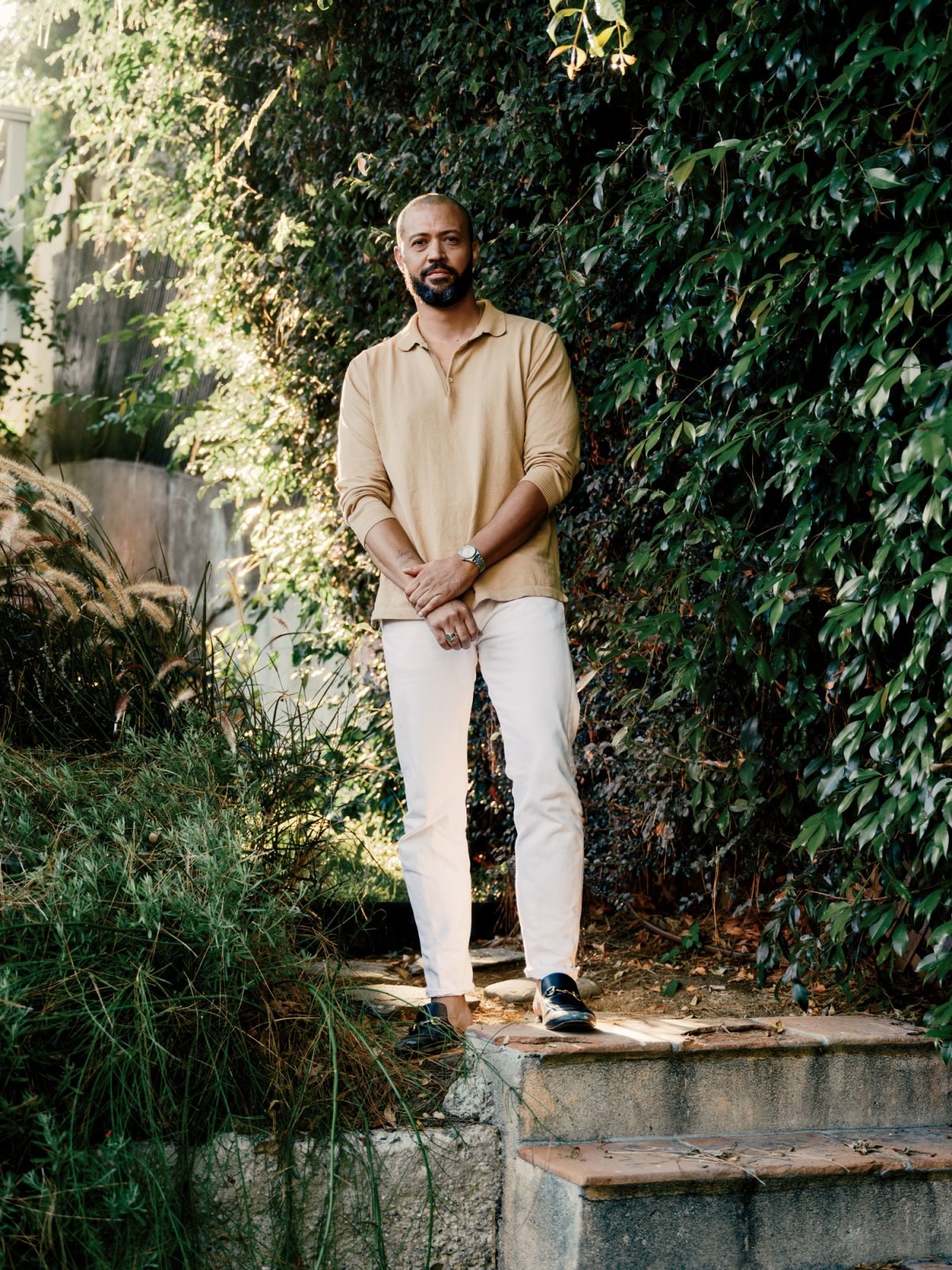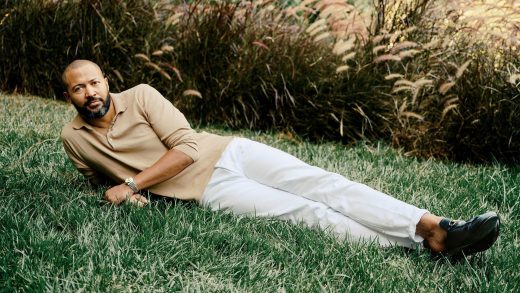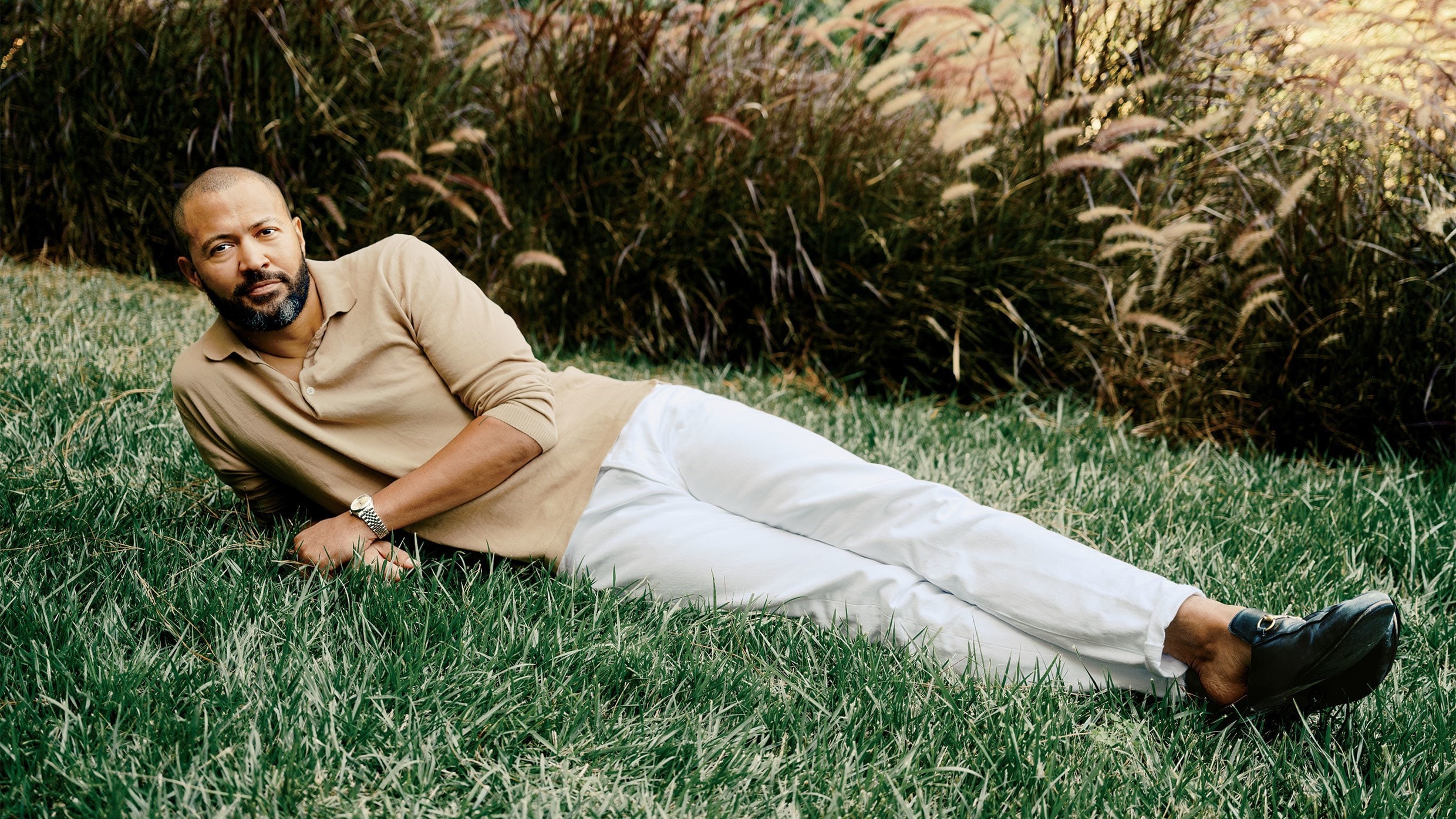‘American Fiction’ director Cord Jefferson on the agony and ecstasy of being a writer in Hollywood today
Cord Jefferson writes to keep from raging. After getting his start in journalism writing about identity and relationships for publications like The New York Times Magazine and editing hot takes at Gawker, he began channeling his ire about race and other social delusions into film and TV work. Since then, he’s helped craft one zeitgeist-capturing show after another—The Nightly Show With Larry Wilmore, Master of None, The Good Place, Watchmen, and Station Eleven—examining the complicated societal factors shaping our culture and exploring his own emotional responses along the way. When he won a Primetime Emmy for Watchmen in 2020, he thanked his therapist. “Therapy should be free in this country,” he quipped.
Now, as he navigates an industry still immobilized by actor and writer strikes, Jefferson makes his directorial debut with the film American Fiction, out December 15, about an English professor (played by Jeffrey Wright) who writes a satirical novel under a pseudonym to expose the racism and hypocrisies of the publishing industry. The film, which recently won the People’s Choice award at the Toronto International Film Festival, is a bit meta, he admits. “Making this movie, I feel like I found the thing that I should have been doing my whole life,” Jefferson says. “At 41, I finally found my footing.” Here, he explains how.
Before you got started in TV, you wrote a great piece on Medium about being a Black journalist and covering what you described as “the racism beat.” What was that like, and how did it inform your career change? The main reason I made the transition [to Hollywood] was that someone gave me an opportunity to. A man named Mike O’Malley was putting together a writers room for a show called Survivor’s Remorse. He reached out to ask if I would come write on the show. It was kind of a gift. I just said yes.
But the piece that you’re talking about, “The Racism Beat”—I felt like I’d become a go-to person for takes about race. I remember a white police chief in Maine had been recorded calling Barack Obama a [N-word]. So, somebody asked me to write an essay about it. I remember thinking about it, and wondering what they expected me to write, and what I could say that hasn’t already been said a thousand times before. I understood then that was not what I wanted to be doing with my life, that I have more to offer beyond writing about the worst—and often the least interesting—things that happen to Black people.
I felt like I had somehow found myself on a revolving wheel of misery and trauma, and I was increasingly expected to make my living by writing about the weekly bad thing that happened to a Black person in America. And that it was my job to try and convince people that those people were worthwhile human beings. I reached a point where I couldn’t do it anymore. When I did finally quit, it felt like I could finally breathe fresh air. But then lo and behold, I got into film and TV and started getting offers to write shows about enslaved people and Black ghosts who come back to exact revenge. It’s a different medium, but the expectations can be similar.
That’s an important point to make, that you can write about Black people without writing about racism. They’re not interchangeable. How have you found opportunities to write about Black people as real people? I’ve been lucky to land on shows that were trying to do things in a novel way. For instance, the character of Chidi on The Good Place is a young Black man with severe anxiety. I’m like, “I relate so much to this.” But it’s not that the work is race-blind. We discussed Chidi’s race and racism in Chidi’s life and colonialism and Africa, all those things. We acknowledge that Chidi is a Black African man, but we also acknowledge that’s not all he is, that he has all these other aspects and facets of his personality and identity.
How does one make a living as a TV writer? It’s becoming more and more difficult, which is why we’re all on strike. Since 2020, I have been in an overall deal where all of my TV work is done for Warner Bros., and I get a flat fee every year. Traditionally, writers work in a writers room and are paid a weekly rate, a script fee, then go work on another show. But [even] that model is increasingly obsolete, which is one of the main reasons that we’re on strike.

There’s uncertainty about what’s going to exist on the other side. I’ve not been getting paid in my overall deal—they stopped the payment a week after the strike began—so I’ve been without a paycheck for the past couple months. There’s anxiety about that. People lose their deals. But hopefully, we’ll be somewhere better than we were beforehand. Hopefully, it will be a more equitable place. I don’t think that we’re going to convince the billionaires to stop being billionaires, but hopefully we can convince them to share a little bit of the wealth.
It’s hard for creatives to move from labor to ownership. That’s fundamental to what’s happening with the strike. It’s also so fundamental to the Black experience, being that we came here as labor and property. Have you figured out how to go from labor to ownership? Is that even a goal for you? My goal has always been to have as few people telling me what to do as possible. That’s freedom, and my goal has always been to be as free as possible. I remember when Prince went to press conferences with “slave” written on his face. I remember that as a kid, being like, “Whoa, this is interesting.” I had no idea what he was fighting for, but now that I’m probably older than he was back then and also involved in the creative industry, I get it fully.
On [one] hand, I have more money right now than I ever thought I would. At the same time, there are so many people doing the work I do who have less than I had when I started out. There’s been a quick erosion, where this is just not a job that people can afford to do. I’m [essentially] in middle management right now—that is where I exist in the hierarchy. [Studios] are like, “Aren’t you with us? Don’t you want these poor writers to shut up?” But I’m on the side of labor, because the point of a union is to support those among us [who have] the least. [The studios] are working to eliminate the job of writer altogether. Eventually, they just want to replace us with robots. So we’re fighting an existential threat to the entire profession.
Your new film is based on a 2001 novel by Percival Everett called Erasure, about a professor and author named Thelonious “Monk” Ellison who mocks the expectations of him as a Black writer by writing a novel titled My Pafology, filled with racist tropes and stereotypes. To his horror, and great comedic effect, the novel is a massive success. Why choose this story for your directorial debut? Erasure resonated with me more deeply than any piece of art I’ve ever come across. Have you ever felt like a book was written especially for you?
Yes! For me, it’s Song of Solomon. That’s how I felt when I was reading Erasure. And then I wrote the screenplay, and I’m sure that some of my own life drifted in there. I think that there are parts of me in every character. But I did love the character of Monk so much. I do feel drawn toward the lovable grump. I started taking antidepressants a couple years ago. I don’t think I was a lovable grump. I was just a grump. I was a moody prick. The thing that made me feel connected to that character is that I spent a very large part of my life hiding myself from the world and lying to people and alienating myself from the closest people to me. I still am an angry person, but I think that I’ve found healthier ways to deal with it.
What are you angry about these days? Oh man! My immediate impulse is just to say “everything!” [laughs] If there’s one catchall, it’s the lying. Everybody’s constantly lying. People in positions of power, especially. They’re just massive hypocrites—which is a form of lying. It feels like you can’t go anywhere without people lying to you, and that’s irrespective of politics. Everybody everywhere has an agenda.
I increasingly feel like nobody is enjoying themselves, you know? It’s becoming harder for people to find things that inspire them. We’ve got a real cynicism problem with younger generations, and it’s our fault. They’ve watched us not pay attention to the fact that the world is on fire—there are environmental catastrophes happening every day now. And we’ve let the gun lobby turn this country into a war zone. All of that makes me so angry.
It’s hard to create art and live artfully through the absurdity of race, capitalism, and even family. You hit the nail on the head. Everybody expects things to be binary. It’s good or bad, wrong or right. But these issues are so complex. We need to make room for that complexity. We need to make room for laughter. That was important to me when I sat down to write the movie—I wanted people to leave the theater laughing and talking about it. I didn’t want people to feel like they were coming in to sit through a two-hour lecture. It’s meant to be enjoyed.
(5)



